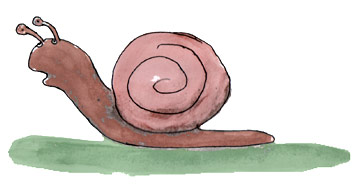
| HOME |
| NERVE |
| REVIEWS |
| ARCHIVE |
| EVENTS |
| LINKS |
| ABOUT US |
| CONTRIBUTORS |
| BACK ISSUES |
| CONTACT US |
Back to index of Nerve 14 - Summer 2009
 The
way we eat our food is inextricably tied up with tradition and culture.
The ‘gobble, gulp and go’ mindset of today reflects the accelerated
culture in which we live. Ideas of ‘progress’ permeate our
way of thinking about the modern world, but eating well is increasingly
a dying art.
The
way we eat our food is inextricably tied up with tradition and culture.
The ‘gobble, gulp and go’ mindset of today reflects the accelerated
culture in which we live. Ideas of ‘progress’ permeate our
way of thinking about the modern world, but eating well is increasingly
a dying art.
Slow Food
I remember going to a café with a friend a few years back. We finished our food and, on the last mouthful, I was (as usual) up and ready to leave. That was until my friend suggested we sit down for a few minutes and appreciate what had just taken place. Otherwise, he suggested, the moment would just become lost in the frenzy of the day. I grew up (after my early years) eating meals in front of the TV. My dad worked shifts and so we ate at different times anyway. Long, convivial meals, with interesting conversation, became, for me, merely the stuff of Woody Allen films or French cinema, where table scenes became a kind of shorthand for sophistication. On subsequent visits to the kitchens of more discerning friends and trips to Europe, I began to see that it was wrong to take as elitist that right to leisure and enjoyment which we all have. What is more I would now argue that what we eat and how we eat are political acts.
The economy demands speed. In the accelerated culture we live in, ‘fast food’ is a major selling point. It’s been increasingly that way since the fifties, when food was first advertised for speed, with the newly emerging TV dinners and instant noodles. There has always been a link between food and technology, and today a high proportion of all British meals are microwaved. We haven’t quite reached that roast dinner in a pill - imagined as the future in the comics of old - but we’re getting there. And it’s not just speed of consumption. Speed of production is perhaps even more important to the capitalist economy. Perhaps food, more than anything else, represents our most fundamental and profound engagement with the natural world. If this is so we are becoming increasingly disconnected from the food we eat and how we eat in ways that deeply affect our being.
The ‘Slow Food’ movement was founded by Carlo Petrini in Italy in 1986. It grew out of opposition and activism against the opening of a McDonald’s near to the Spanish Steps in Rome. The movement has grown significantly, and last summer more than 85,000 attended events at a convivia in San Francisco. In the early days, Slow Food was criticised for perceived elitism and narcissism, but the movement has increasingly engaged with the wider issues of food production. The emphasis is firmly on sustainable farming, local and seasonal produce and biodiversity. However, as Eric Schlosser (who wrote Fast Food Nation) has cautioned: “I don’t care if my tomato is heirloom, local and organic if it’s harvested with slave labour”. Carlo Petrini goes further in pointing out the illusory quality of pleasure in modern life. Real pleasure, he argues, comes in knowing what you are tasting and there is no ‘good taste’ without awareness. These considerations have important implications in the way we think about the rights of migrant workers, of societies uprooted by the global food industry and, not least, our treatment of animals.
For those who grew up with tasteless, processed food, a renewed emphasis on taste is surely welcome. Issues of taste can be conflated with elitism, as though taste was in itself an elitist concept. However, education of your senses is open to anybody. Preparing food can be a relaxing, indeed a meditative act, and preparing food for others a timeless act of love. A ‘companion’ is literally someone who you break bread with. The rituals we have around food give us a sense of permanence, community and certainty. Slowness is a kind of remembering which demands of us more than blind consumption.
Fifty years ago we spent 50% of our income on food. Today it is less than 15%. It is a truism that we may have to start paying more for our food. We in the Western world are not materially poor but we live in a de-spiritualised culture which is fractured and atomised. As in any thoughtful pursuit, those in the Slow Food movement have seen that it’s not enough to attempt single fixes (appealing though long, leisurely and convivial mealtimes may be) but that, as Petrini says, we must increase our awareness of the wider system. I would argue that in a society that bombards us with advertising and ‘infotainment’, we increasingly need spaces to step back from the world in contemplation to open up new possibilities. The very fundamental relevance of food to human beings and the rituals we have consequently attached to communal celebration of the stuff of life are under threat, but in that very fundamentality lies an opportunity to snatch back time for ourselves and imagine another way of being.